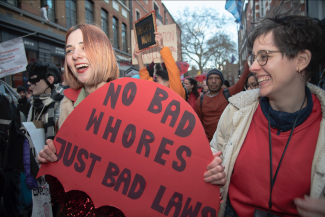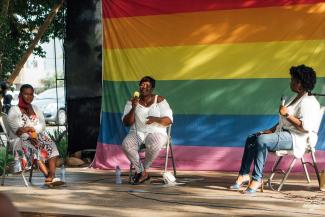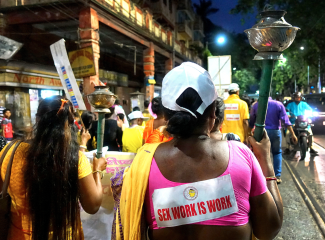A personal reflection by African feminist Nana Darkoa Sekyiamah.
I used to think that people who did sex work had found themselves in a situation where they had no choice but to do sex work, and that the job of feminists was to help sex workers find alternative sources of income.

In 2010, I attended the XVIII International AIDS Conference in Vienna, Austria. One of the sessions I went to was about sex work, and I asked a question that today I feel embarrassed to own up to: “Why would anyone choose to do sex work?”
You can imagine how the temperature of the room – full of sex worker rights activists – plummeted. I can’t even remember what response I got from the panel, but I do remember the conversation I had later with Bisi Adeleye-Fayemi, then executive director of the African Women’s Development Fund, (the organisation I worked for at the time).
"Discrimination and stigma against sex workers generates violence."
Most of us grow up in patriarchal societies and from birth are fed particular narratives around what is right and wrong. As a young girl at a Catholic boarding school I learnt that only bad girls had sex. Some girls were described as ‘mattresses’ because, allegedly, all the boys in the neighbourhood had slept with them. It was only when stories started to spread about who I had slept with that I realised that rumours were just that. It took many more years before I began to question why society tries to control women’s bodies, choices and sexualities.
On our way back to the hotel, Adeleye-Fayemi explained to me that people were entitled to make choices about their life, they may make different decisions depending on their current life circumstances, and that for many people sex work was a logical choice.

That car ride started a journey for me. I began not only to think about sex work as legitimate work, but ultimately it brought me to a place in my own organising where today I work with others to create spaces where activists, including sex workers and other historically oppressed groups, are able to share the realities of their own lives with other people.
Two years ago, I saw there was a need for a festival focused on sex, sexualities and pleasure, and brought together a group of feminist, queer and trans activists to co-organise such an event in Accra, Ghana. It was a success, so we decided to make the festival an annual one.
In November 2020, the second edition of #AdventuresLive took place under the theme Odyssey of Desire. One of our sessions was on ‘Addressing Violence Against Ghanaian Sex Workers’, with Bridget Dixon and Mariama Yusuf who work with Women of Dignity Alliance. They spoke about the violence that sex workers in Ghana face and in particular how this violence often comes from police officers who arrest, rape and then rob them of their earnings.
Dixon and Yusuf were clear that these acts of violence are perpetrated against sex workers because such work is criminalised – and they call for sex work to be decriminalised. This is a demand that sex worker activists have long made. According to the Count Me In! consortium: “To a large extent, the violence in the lives of sex workers is created by the conditions of criminalisation. Sex work is not inherently violent but discrimination and stigma against sex workers generates violence and limits sex workers access to justice.”

Some of the stigma that sex workers face come from feminists who seek to end sex work, and conflate the trade with human trafficking, and yet the difference is clear. Sex work is undertaken by consenting adults and human trafficking is not. As stated in ‘Behind the Rescue: How Anti-tracking investigations and Policies Harm Migrant Sex Workers,“...in reality, anti-trafficking investigations are often racist, anti sex-work and anti-migrant. The intersection of criminal laws, immigration laws and municipal bylaws are used against migrant sex workers while human rights violations against these workers are justified by labelling them as illegal workers and criminals.”
Listen, learn and unlearn
Clearly, people don’t switch in an instance from being a feminist who judges the work that other people do, to advocating for sex workers’ rights – and so I want to share some of what has helped me expand my understanding of this subject.
I started reading books, articles and resources about sex work. I found the book ‘Women, Sexuality and Pleasure’ particularly helpful, and reviewed it for Feminist Africa. I also attended panels, events and conversations convened by sex workers and their allies. When you listen to the people who are most affected by an issue, you are more likely to gain a deeper understanding of that issue. On social media, I follow some sex worker activists, and their posts and insights into their work continue to give me opportunities to learn and grow. One such example is this thread by Christy Croft that got retweeted on my timeline.

Sadly, the issue of sex workers’ rights continues to be a point of tension for the global feminist movement, and there are too many feminists today who feel how I felt ten years ago. All I can encourage those feminists to do is to open their hearts and minds, and to listen to sex workers. It is way past time for all feminists to recognise that advocating for sex workers’ rights is a fundamental contribution towards the battle to end violence against women and girls.
But it was a recent learning session by AWID and the Red Umbrella Fund – called ‘Under the Same Umbrella: feminism and sex workers' rights’ – in which I found myself reflecting on my own journey to this point. This title speaks to me of the indivisibility of feminism and the ongoing work to protect and advance the human rights of sex workers. Listening to the panelists – Vera Rodriguez from Red Umbrella Fund, Kay Thi Win from the Asia Pacific Network of Sex Workers, Geeta Misra from CREA – I realised that I finally understand that feminism and sex workers’ rights are indeed under the same umbrella.
I have done what CREA has long advocated: suspend judgement. The call to suspend judgement is a reminder to set aside your preconceived notions, and to open your hearts and minds to learn and unlearn.
2224x1253.jpg)